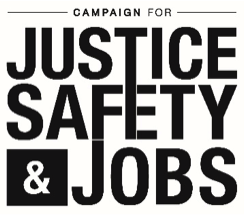City Council to work with Campaign for Justice, Safety & Jobs to legislate reforms to BPD
Baltimore City, MD — After more than a decade of advocacy by the people of Baltimore City to restore local control of the Baltimore City Police Department (BPD), we were about to clear the last bureaucratic hurdle during the 2023 session of the Maryland General Assembly, which concluded Monday. However, Mayor Brandon Scott, Senate President Bill Ferguson, and Senators Antonio Hayes and Cory McCray supported harmful amendments to SB758/HB853 that would have left the City Council unable to legislate on anything of significance related to the BPD. As a direct result, the legislation did not pass this session.
“Mayor Scott, President Ferguson, and Senators Hayes and McCray’s efforts to prevent City Council from having full legislative authority over the BPD is unconscionable. Had they been successful, they would have turned fully democratic local control into unilateral mayoral control,” said Sam Masters of Organizing Black. “Their attempt to subvert the people’s will is autocratic and short-sighted. Gutting, and therefore killing, SB758/HB853 was an outrageous attempt to disenfranchise our repeatedly disenfranchised, majority-Black city.”
In 2021, the General Assembly passed legislation to restore local control of the BPD provided that Baltimore residents ratify an amendment to the City Charter which last November voters overwhelmingly approved, making the police department a City agency as of January 1, 2023. Despite this monumental victory, a remaining provision in the City Charter technically prohibited the City Council from legislating much-needed reforms to the BPD. To fulfill the clear mandate of the people and swiftly implement local control, Senator Jill Carter and Delegate Stephanie Smith introduced SB758/HB853, a bill which would have eliminated the outdated restrictive language effective June 1, 2023. Their bill was supported by the City Council and passed by the House.
However, Mayor Scott, who campaigned on local control and once said it was key to building “transparency and accountability,” walked back his promise. Alongside Senate President Ferguson and Senators Hayes and McCray, he pushed for weakening amendments to curtail the City Council’s legislative oversight of the BPD, despite a lack of similar restriction of their authority over any other City agencies or on the legislative bodies of any other Maryland jurisdictions over their police departments.
“It is deeply disappointing to see Mayor Scott go back on his word,” said Molly Amster, Maryland Policy Director and Baltimore Director of Jews United for Justice. “Immediate implementation of local control is, as he once said, ‘a fundamental matter of police accountability, representative democracy, and racial justice,’ and as Baltimore’s consent decree report stressed, must occur with ‘all deliberate speed.’”
Earlier this year Attorney General Anthony Brown’s office issued an opinion holding that, despite the restrictive City Charter provision, the City Council is entitled to legislate reforms to the BPD because it is now a city agency. Accordingly, the Campaign for Justice, Safety & Jobs (CJSJ) will work with the City Council to do so.
“Baltimore City is the only locality in Maryland, and one of two in the entire country, that doesn’t control its own police department. There have been countless examples of our police department and others across the nation using brutal and deadly force against residents, and to deny our own elected representatives the opportunity that other jurisdictions have to change the BPD’s police and procedures is structurally racist,” said Ray Kelly of Citizens Policing Project. “We cannot allow elected officials to keep denying the will of the people and we will mobilize to make sure to address this over the coming year.”
###
The Campaign for Justice, Safety & Jobs (CJSJ) is a coalition of more than 20 community, faith, labor, and civil rights organizations that convened in April 2015 to address the systemic injustices unearthed by Freddie Gray’s police murder and the subsequent uprising throughout Baltimore City.
Stay Informed
Sign up to be the first to hear about how to take action.
By completing this form, I agree to receive occasional emails per the terms of the ACLU’s privacy statement.
By completing this form, I agree to receive occasional emails per the terms of the ACLU’s privacy statement.

